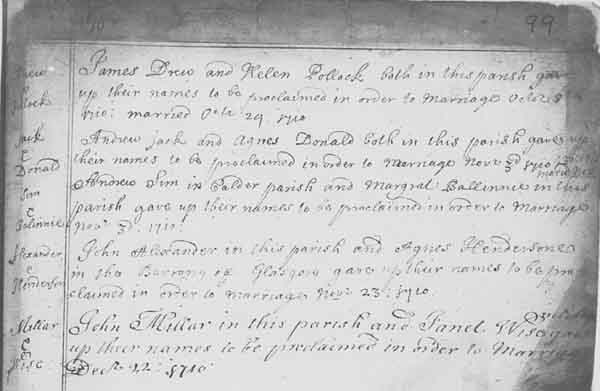Old Parish Registers – Marriages and Proclamation of Banns
Old Parish Registers – Marriages and Proclamation of Banns
The most that you can expect to find in an Old Parish Register marriage entry is:
- date(s) of the proclamation of banns of the intended marriage and date of marriage
- names of the bride and groom and their parish(es) of residence
- occupation of the groom
- name of the bride's father and his occupation and whether deceased
- name of the minister and the church where the marriage took place.
This guide covers:
Proclamation of the Banns of Marriage
The banns (or notice of the proposed marriage) were proclaimed in the kirk before the congregation on three successive Sundays in case there was any impediment to the marriage. If the bride and groom lived in different parishes the banns were proclaimed in both although not necessarily on the same dates. As a result you will often find two index entries for your marriage search as the proclamation of banns were recorded in each of the respective Old Parish Registers.
In this example from the Old Parish Register for New or East Kilpatrick (our reference OPR 500/10) most of the couples being proclaimed in 1710 live in the parish but Agnes Henderson is from the Barony of Glasgow.
The proclamation of marriage by Agnes Henderson and John Alexander is also recorded in the Old Parish Register for Barony (our reference OPR 622/60) and provides additional information, namely that they were lawfully proclaimed and married.
Contracts of Marriage
Sometimes only contracts of marriage are recorded. These give the names of the bride and groom and their respective parishes as in this example from the Old Parish Register for St Cyrus (our reference OPR 267/10).
Irregular or Clandestine Marriages
There are also irregular or clandestine marriage entries. The Old Parish Register for Dalton in Dumfriesshire includes several from 1769 to 1804. In some cases the couple were called before the kirk session to make public acknowledgement of their marriage. In others they were rebuked for marrying irregularly, that is, without the proclamation of banns. In all cases they paid a fine.
In this example from 1773 (our reference OPR 818/2) a couple made a public acknowledgement of their irregular marriage and paid a fine of a guinea to the poor. The entry is followed by a note of the kirk session’s concern at the frequency of irregular marriages in the parish and their decision to increase the fine!
For information about marriages at Gretna Green and other places along the Scottish-English border please go to our record guide on Irregular Border Marriage Registers.
For more examples of Old Parish Register marriages see our Genealogical Gems page.



